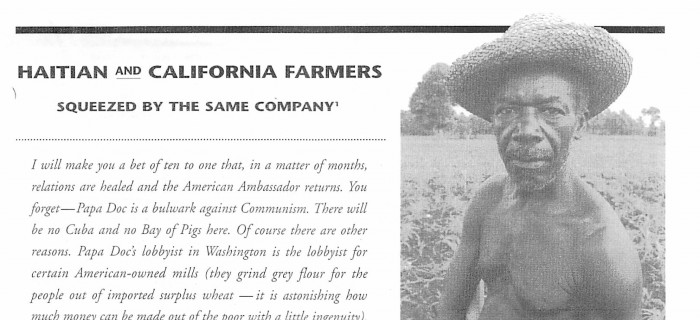Haitian and California Farmers: Squeezed by the Same Company
Food First Backgrounder, Fall 1996, Vol. 3, No. 3
Today the Clinton administration touts as a major foreign policy success the U.S. role in returning former President Jean-Bertrand Aristide and ousting coup leaders Raoul Cedras and company. But as the “price” for his return , the Clinton administration, in conjunction with the World Bank and the International Monetary Fund, placed demands on President Aristide. The agreements President Aristide signed continue a long U.S. tradition of undermining Haiti’s national food self-sufficiency and Haitian’s household food security. These neoliberal economic policies are an instant replay of the export driven policies in Africa and Central America discussed in Food First’s last News and Views and Backgrounder, “Anatomy of a Disaster.” Economic and political power will become further entrenched in the hands of a few if Haiti agrees to U.S. demands.
Cedras and his armed thugs have conducted a reign of terror, executing children, raping women, killing priests.” US President Bill Clinton intoned in September 1994, “The message of the United States to the Haitian dictators is clear; your time is up. Leave now, or we will force you from power.
The U.S. and the international financial institutions are demanding that Haiti halve its civil service, privatize public services, slash tariffs and import restrictions, get rid of price and foreign exchange controls, grant “emergency” aid to the export sector, reinforce an “open foreign investment policy,” create special corporate courts where “judges are more aware of the implications of the their decisions for economic efficiency,” rewrite its corporate laws, limit the scope of state activity and regulation, and diminish the power of the executive branch in favor of the traditionally more conservative Parliament.


 Help Food First to continue growing an informed, transformative, and flourishing food movement.
Help Food First to continue growing an informed, transformative, and flourishing food movement.




